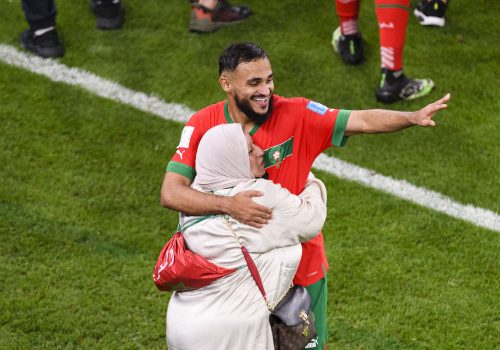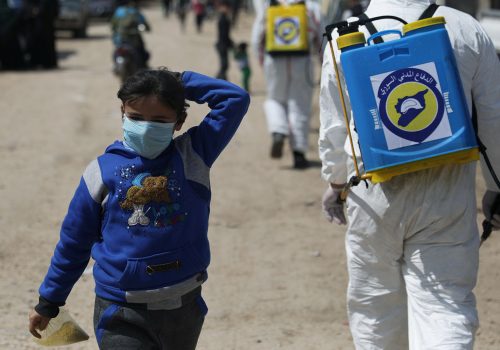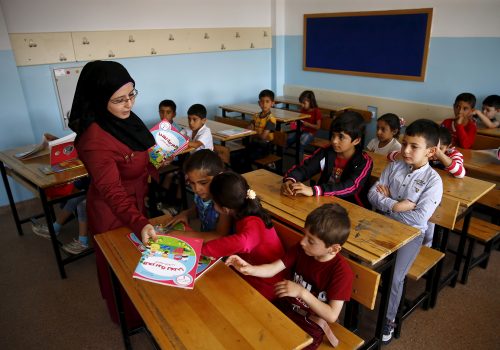Afrocentrism is trending in the Maghreb. It’s because Sub-Saharan migrants are rewriting their narrative.
North Africa morphing into a permanent host destination rather than a transit country on the way to Europe for hundreds of thousands of Sub-Saharan Africans is no news. What is new, however, is a rising Afrocentric discourse across social media platforms calling for “reappropriating” North Africa and “chasing” the non-black inhabitants of Morocco, Algeria, Libya, and Tunisia from the continent on the pretense that they are illegitimately colonizing the land.
This evolving discourse provides an ideological framework for Sub-Saharan African migrants subjected to documented instances of racism and expulsion during their stay in North African countries by local inhabitants and authorities. This new narrative transcends the conventional motivation of seeking exile or improved livelihoods in Europe and using these countries as a route to cross the Mediterranean clandestinely. It also supports a grotesque and historically misleading account about the origins of native Amazigh people of the region being inherently non-African because of their light skin color.
Resisting racism with Afrocentrism
In a speech on February 21, Tunisian President Kais Saied claimed that Sub-Saharan migrants “threaten the country’s national identity and must be stopped,” renewing the debate regarding xenophobia and discrimination against black communities in Tunisia. The divisive comments instigated the outrage of human rights activists at the national and international levels as the Maghreb region has been overwhelmed by waves of migrants and asylum seekers looking for dignity and improved living standards for the past two decades, aggravated by the Libyan crisis.
North African countries, already migration departure nations with over 12.3 million migrants internationally, have mixed records in dealing with the Sub-Saharan migration issue ranging from mass repatriations and ghettoization to limited efforts of naturalization and integration. Soaring inflation and unemployment rates in some countries led to a growing sentiment of prejudice and chauvinistic hate speech. It’s impossible to forget the outrageous scenes of stranded migrants left to starve in the open desert between Algeria and Niger over the past few years or others beaten to death as they attempted to climb the fence surrounding the fortified enclave of Melilla.
Sub-Saharan migrants, infuriated by decades of mistreatment by Europeans and now by North Africans, found refuge in a new Afrocentric discourse to justify their right to exist and stay in the Maghreb facing racism with reversed racism and asking Moroccans, Algerians, Tunisians, and Libyans to “go back to Asia” where they supposedly originated from. Afrocentric adepts even assert that the real Moorish people were black, and so were the pharaohs, and claim all civilizational glories that took place on African soil as inherently black.
The circulating social media clips and comments call to re-Africanize the Maghreb through mixed marriages and mass immigration. This movement is capitalizing on the Black Lives Matter movement, which reignited a pan-African sentiment and repositioned blackness in the political agendas in the United States and Europe to create the buzz and hide a more complex demographical and discursive phenomenon.
Historical misconceptions and racist legacies
The problem with this approach lies primarily in its erroneous historical accuracy. North Africa has always been the ancestral land of the Amazigh or Imazighen people, as proven by neolithic archeological excavations going back to at least 10,000 BC and known accounts from the antiquity encounters of Greek, Roman, and Phoenician with the Numidian, Mauri, and Libu people. Amazighs are also a distinct group anthropologically with specific genetic make, language, and culture processing ties with all of Africa, Asia, and the Mediterranean. Arab settlers from the gulf and Levant colonized the region much later and were faced with fierce resistance by the autochthones led by their queen Al-Kahina in the eighth century.
The Berber and Arab people of the Maghreb have ongoing ethno-nationalistic divergences, as some Amazighs continue to claim to be ostracized by a ruling Arab class. This was exacerbated by French colonial rule, which intentionally distinguished between Arabs and Berbers in education, local government, and laws. Certain groups, like the Kabyles in Algeria, still sustain separatist demands and even have a government in exile. Nevertheless, the truth is that centuries of intermarriages and assimilation have created an amalgamation of both communities and gave birth to today’s North African identity, where it is impossible to proclaim ethnic purity. Black Africans themselves could not be reduced today to one race or culture, and it is utterly reductionist and essentialist to say an Ethiopian is the same as a Congolese or to compare a Sudanese with a South African.
The recent tensions between Sub-Saharan Africa and North Africa may be explained by the historical ties between the two regions of the continent, where the latter repetitively subjugated the first and annexed them as part of its empires. The Maghreb, additionally, has an undeniable dark heritage legacy of being slave owners and traders. In his book Black Morocco: A History of Slavery, Race, and Islam, Arizona University professor Chouki El Hamel revisits this least-known chronicle of the region’s past, where western Africans were captured, emasculated, and used as soldiers or sold off to slave merchants and shipped to the new continent. Domestic slaves had a much grimmer faith, as they were subjected to physical violence, rape, and exploitation.
North Africa undoubtedly faces a serious migration problem that will continue to aggravate if not addressed regarding its social, cultural, and historical dimensions and root causes. The Sahara and the Sahel are already extremely precarious zones, with flourishing mercenaries and extremist groups recruiting migrants and utilizing them to destabilize the entire region. The security approach that Tunisian President Saied is preaching for would not suffice; only a more prosperous and economically integrated West Africa with its northern neighbors could provide a pathway to stabilization.
Sarah Zaaimi is the deputy director for communications at the Atlantic Council’s Rafik Hariri Center & Middle East programs
Further reading
Wed, Dec 14, 2022
Morocco’s World Cup victories are historical revenge for subaltern dreamers from the global south
MENASource By Sarah Zaaimi
The defeat-free journey of the Moroccan soccer national team, the Atlas Lions, is more than a simple sports score.
Fri, Mar 27, 2020
Coronavirus is exacerbating the precarious situation of Syrian refugees and IDPs
MENASource By Pınar Dost
As the countries across the world attempt to grapple with the unfolding pandemic, there is a real risk of overlooking the situation of refugees, who due to their living conditions are among the most vulnerable to a serious outbreak. The pandemic comes at a particularly precarious time as the future of Idlib and the EU-Turkey migration deal are in doubt.
Sat, Dec 3, 2022
How an organization is promoting non-violence, tolerance, and peace in school education across the Middle East
MENASource By
The Institute for Monitoring Peace and Cultural Tolerance in School Education (IMPACT-se) brings a practical approach to the field of educational research and policymaking.
Image: Demonstration in support of migrants and against racism at the call of civil society following the words of Kais Saied, President of Tunisia, against sub-Saharan migrants in Tunisia. Kais Saied claimed that sub-Saharan migrants sought to colonize Tunisia and threatened Arab-Muslim identity. These words only reinforced the attacks against this community and officially triggered a wave of arrests throughout the country. The demonstrators chanted several slogans to express their solidarity with the migrants and to call for the regularization of the situation of those who find themselves in an irregular situation. Tunis, Tunisia, on February 25, 2023. Photo by Nicolas Fauque/Images de Tunisie/ABACAPRESS.COM


